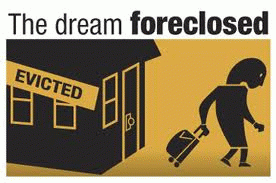You're a lot poorer than you thought you were.
According to a report by Sentier Research "real median annual household income" has fallen by 4.8 percent since the "economic recovery' began in June 2009."
That's worse than the 2.6 percent decline that took place during the recession itself. (between July 2007 to June 2009) All told -- from the beginning of the slump in 2007 until today -- median household income has dropped an eyewatering 7.2 percent. ("Changes in Household Income During the Economic Recovery: June 2009 to June 2012," Sentier Research)
Like I said, you're a lot poorer than you thought you were.
The Sentier Research report comes on the heels of a similar report from the Fed which was released in June showing that middle class families saw a nearly 40 percent decline in their net worth between the years 2007 to 2010. The Fed's 80-page tri-annual Survey of Consumer Finances, points to the Great Recession as the putative cause of the overall decline in wealth, but the Fed's lopsided policies could be as easily blamed. Low interest rates, lax lending standards and outright fraud generated asset-price bubbles that wiped out two decades of economic gains for working people in the US.
The Fed's survey found that the median net worth of families in the US fell by 38.9 percent between 2007 and 2010, from $126,400 to $77,300. Also, the median value of a US home dropped by 42 percent, from $95,300 to $55,000 in the same period. Plunging housing prices have increased the burden of mortgage debt leaving more than 20 percent of all homeowners with negative equity which greatly increases the probability of default.
Is it any wonder why consumer confidence is at its lowest point since November 2011? Or why mom and pop investors are still fleeing the stock market in record numbers four years after Lehman Brothers failed? Or why the yields on 10-year Treasuries are still hovering below 2 percent? Or why bank deposits now vastly exceed loans?
All of these are signs of extreme distress, which is why working people have grown so gloomy about the future. Did you know that (according to the Pew Research Center) 61 percent of all Americans were "middle income" back in 1971, while, today, the number has been shaved to 51 percent? That explains why 85 percent of the people surveyed said that "it is harder to maintain a middle class standard of living today compared with 10 years ago." The majority of the people also admitted that they've had to reduce their spending in the past year.
What all of these reports indicate is that the US middle class is being drawn-and-quartered by economic policies which serve to enrich the few at the cost of the many.
Of course, Fed chairman Ben Bernanke is going to "put things right" by launching another round of quantitative easing (QE) which is supposed to boost growth and lower unemployment. Unfortunately, QE doesn't really work like that; in fact, the Bank of England just released a report that proves that central bank asset purchases disproportionately benefit the rich. Here's a clip from an article in the Washington Post:
"The richest 10% of households in Britain have seen the value of their assets increase by up to - 322,000 [$510,000] as a result of the Bank of England's attempts to use electronic money creation to lift the economy out of its deepest post-war slump. ...
"The Bank of England calculated that the value of shares and bonds had risen by 26% -- or - 600bn -- as a result of the policy, equivalent to - 10,000 for each household in the UK. It added, however, that 40% of the gains went to the richest 5% of households."
"It's not hard to see why this happens. One way the bank's quantitative easing program works, in theory, by pushing up asset prices in order to support the broader economy. And, according to the Bank of England, the median British household only holds about $2,370 in financial assets. So the direct benefits largely accrue to wealthier households.
"What about the United States? Much like in Britain, the distribution of financial assets are also heavily skewed. ... So any move by the Fed to push up asset prices is likely to increase wealth inequality in the short term." ("Will the Fed's efforts to boost the economy only benefit the wealthiest?" Washington Post)
So QE is just a scam to line the pockets of the investor class. Imagine that! It took four years and a research team of financial geniuses from the BOE to figure that out.
And here's something else that's worth mulling over; working people are getting totally screwed in the deal. Not only are savers and fixed-income retirees being robbed of the puny gains they would have seen if rates were in their normal range instead of zero, but also the prospect of more QE has sent gas futures spiking, while food prices are sure to follow. This is from Bloomberg in an article titled "Bernanke Boosts Oil Bulls to Highest Since May: Energy Markets":
(Note: You can view every article as one long page if you sign up as an Advocate Member, or higher).






